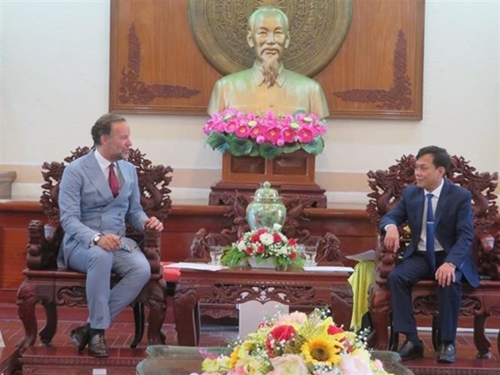According to He, the Mekong Delta city has strength in agriculture, but the locality in particular and the Mekong Delta region in general are suffering from negative impacts from climate change, especially flooding and saltwater intrusion.
    |
 |
|
Vice Chairman of the Can Tho People’s Committee Nguyen Ngoc He (right) and the Dutch Consul General in Ho Chi Minh City, Daniel Stork |
He suggested the two sides expand cooperation in the areas where the Netherlands has experience, thus Can Tho can learn from experience of the country.
The Can Tho official expressed the hope that the Consul General will help introduce Can Tho's potential and investment attraction policies to Dutch business associations and investors, thus promoting the locality’s exports such as garments, footwear, agricultural and aquatic products to the European country.
According to He, Can Tho is calling for potential investors to invest in the fields of agro-fishery processing, manufacturing industry, hi-tech agriculture, information technology, infrastructure construction, and trade.
For his part, Stork said that many Dutch enterprises have strengths in responding to and adapting to inundation caused by sea level rise. The Netherlands is also the world's second largest exporter of agricultural products thanks to the application of many high-tech agriculture models, which help reduce labour costs and post-harvest losses.
The Netherlands is willing to cooperate with Can Tho in the above-mentioned areas, the diplomat said, adding that a number of Dutch organizations such as TOC, VEI, and Blue Deal, through non-governmental projects, are supporting Can Tho in models related to environmental protection, climate change adaptation, and water management. He named as an example a project to automatically collect floating garbage in rivers in Can Tho city worth 630,000 USD funded by the Ocean Cleanup (TOC) organization.
Statistics from the municipal Department of Foreign Affairs, Can Tho’s export turnover to the Netherlands reached 28.96 million USD, with the main items being rice, seafood, farm produce, and processed agricultural products and foods, and textiles among others. Meanwhile, the city spent 1.07 million USD on importing goods from the European country, mainly pharmaceutical materials.
Source: VNA